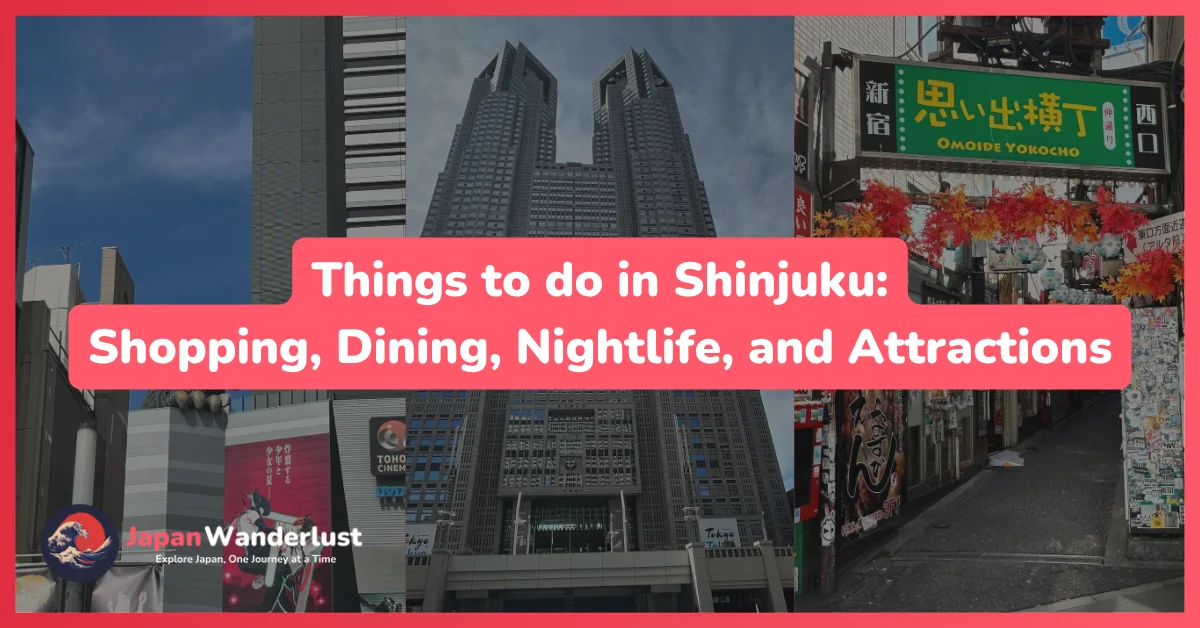Shinjuku is where you feel the pulse of Tokyo the moment you step outside the station. Skyscrapers rise overhead. Neon signs flicker to life as evening falls. Just a short walk away, quiet paths and green lawns offer space to slow down. Few districts show Tokyo’s contrasts as clearly as this one.
Located on the western side of central Tokyo, Shinjuku is built around one of the city’s busiest transport hubs. From here, you can dive straight into department stores, underground shopping malls, and buzzing entertainment streets. Yet only minutes away, you will find narrow alleyways filled with tiny restaurants and the kind of local atmosphere that feels unchanged for decades. In places like Omoide Yokocho, smoke drifts from small grills and conversations spill into the lane. A few blocks over, Kabukicho glows with bright lights and late-night energy.
Shinjuku also makes space for quiet moments. At Shinjuku Gyoen National Garden, you can walk beneath cherry blossoms in spring, rest in the shade during summer, or enjoy crisp autumn colors. For sweeping city views, the observation decks of the Tokyo Metropolitan Government Building offer a panoramic look across Tokyo’s skyline. Seasonal illuminations and nighttime views add yet another layer to the experience.
This mix of energy and calm is why Shinjuku appeals to so many travelers. First-time visitors come for the classic Tokyo skyline and vibrant streets. Returning visitors often wander deeper, exploring smaller side roads and discovering favorite food spots. Families, couples, and solo travelers can all shape their own experience here, whether that means shopping, sightseeing, relaxing in a park, or staying out late.
This guide brings together 23 things to do in Shinjuku. It covers the major highlights while also pointing you toward everyday scenes that reveal the district’s character. Some experiences fit neatly into a short stop between trains. Others reward you for slowing down and staying a while.
From famous landmarks to tucked-away corners, the list ahead shows why Shinjuku remains one of the most visited and memorable districts in Tokyo.
Is Shinjuku safe at night, especially around Kabukicho and Golden Gai?
Yes, Shinjuku is generally very safe at night, including around Kabukicho and Golden Gai. Tokyo has low violent crime rates, and even late in the evening the area remains well-lit and busy with people commuting, dining, and socializing.
Kabukicho is Shinjuku’s main entertainment district. It is lively and neon-filled, with bars, restaurants, and arcades. While it has a nightlife reputation, most visitors find it energetic rather than threatening. That said, this is still a major entertainment area. A little awareness goes a long way, especially if you’re traveling with children.
A few simple habits make the experience comfortable:
- Stick to well-lit streets near Shinjuku Station and Yasukuni-dori Avenue
- Politely ignore street promoters inviting you into bars
- Keep phones and bags secure in busy areas
- Visit earlier in the evening if you have younger kids
A short walk away, Golden Gai feels completely different. The narrow alleys and tiny bars preserve a nostalgic Showa-era atmosphere. It is safe to stroll through and take photos, especially before it gets too late. Most of the bars are very small and geared toward adults, but walking through the area itself is not a problem.
If nightlife is not your priority, Shinjuku offers calmer evening options:
- Free observation decks at the Tokyo Metropolitan Government Building
- Open green space at Shinjuku Central Park
- Food halls inside Isetan Shinjuku or Takashimaya Times Square
Tokyo’s safety culture is one of the reasons families feel comfortable exploring at night. Clean streets, visible police boxes, and bright lighting all help. With normal big-city awareness, Shinjuku is approachable and surprisingly easy to enjoy.
What is the best way to navigate Shinjuku Station without getting lost?
The best way to navigate Shinjuku Station without getting lost is to decide your train line and your exit before you go inside. Most people feel overwhelmed because they try to figure everything out once they are already underground.
Shinjuku Station is the busiest railway station in the world. It connects multiple rail operators and functions more like a small underground city than a single terminal. The first visit can feel intense, especially during busy hours, but it becomes manageable once you narrow your focus.
Before entering, confirm which railway company you need. That single step prevents most confusion.
- JR East lines for central Tokyo travel
- Odakyu Electric Railway for Hakone and Odawara
- Keio Corporation for Mount Takao
- Tokyo Metro and Toei Subway for city routes
Inside the station, focus only on the signs for your specific line. The color coding is consistent, and English signage is clear. People usually get turned around when they follow general direction signs instead of line names and symbols.
Tips that make a big difference
Choose your exit in advance. Shinjuku Station has dozens of exits, but most visitors only need a few key ones:
- East Exit for Kabukicho and shopping
- West Exit for the Tokyo Metropolitan Government Building
- South or New South Exit for Takashimaya Times Square
- Busta Shinjuku for airport and highway buses
Deciding this before you start walking saves time and unnecessary backtracking.
- Give yourself extra time. Transfers can take 10 to 15 minutes, especially with luggage or children. The station is large, and platforms are not always close together. Rushing is what makes it stressful.
- Avoid peak commute hours. Weekday mornings and early evenings are crowded with office workers. Late morning and early afternoon are noticeably calmer and easier for families.
- Use navigation apps. Google Maps and Japan Transit Planner show platforms, transfer routes, and exits clearly. Checking the app before you move reduces second-guessing.
For meeting up, the East Exit police box or the JR East Travel Service Center are easy landmarks to spot.
After one or two visits, Shinjuku Station begins to feel logical rather than chaotic. Once you understand the exits and line structure, it becomes one of the most efficient gateways to exploring Tokyo.
23 Top Things to Do in Shinjuku, Tokyo
1. Shinjuku Gyoen National Garden: A Seasonal Oasis in Tokyo
Shinjuku Gyoen National Garden combines traditional Japanese, French, and English landscape designs, creating a unique and serene urban oasis. This expansive park showcases seasonal highlights that captivate visitors throughout the year. In spring, cherry blossoms blanket the garden, making it a popular spot for hanami (cherry blossom viewing), while autumn transforms the grounds into a vibrant tapestry of red and gold foliage. The garden’s layout reflects the meticulous art of Japanese garden design, with koi-filled ponds, meandering paths, and perfectly pruned trees.
One of the garden’s unique experiences is its tea house, where visitors can enjoy a matcha tea ceremony in a peaceful setting, surrounded by the garden’s beauty. This offers a glimpse into traditional Japanese culture while providing a tranquil respite from the bustling city. With its blend of natural splendor and cultural richness, Shinjuku Gyoen remains a must-visit for those seeking a serene escape in the heart of Tokyo.
Address: 11 Naitomachi, Shinjuku City, Tokyo 160-0014, Japan
Website URL: https://www.env.go.jp/garden/shinjukugyoen/english/index.html
Phone Number: +81 3-3350-0151
Operating Hours: 9:00 AM – 4:30 PM (Last entry at 4:00 PM)
2. Tokyo Metropolitan Government Building: Panoramic City Views for Free
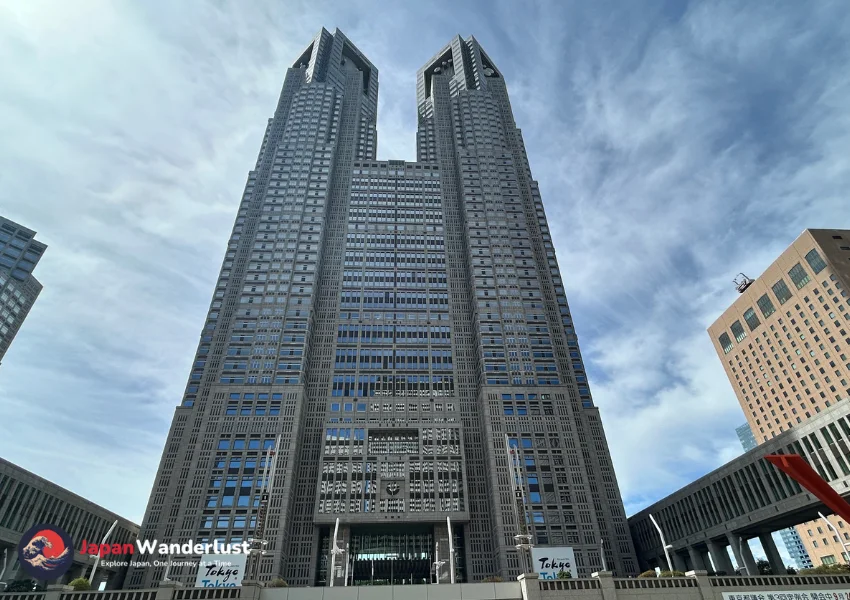
The Tokyo Metropolitan Government Building stands as a dual-tower skyscraper offering breathtaking observation decks. Visitors are drawn to its panoramic views of Tokyo’s skyline, with landmarks such as Tokyo Tower, Tokyo Skytree, and even Mt. Fuji visible on clear days. Best of all, entry to these observation decks is free, making it an attractive option for budget travelers and sightseers alike.
Aside from its unparalleled views, the building itself is an architectural marvel designed by Kenzo Tange, blending modernism with practicality. The observation decks provide a 360-degree perspective of the city, making it an excellent spot for photography enthusiasts or those who wish to experience Tokyo from above. Whether during the day or at sunset, the Tokyo Metropolitan Government Building offers a unique vantage point over the city’s sprawling landscape.
Address: 11 Naitomachi, Shinjuku City, Tokyo 160-0014, Japan
Website URL: https://www.env.go.jp/garden/shinjukugyoen/english/index.html
Phone Number: +81 3-3350-0151
Operating Hours: 9:00 AM – 4:30 PM (Last entry at 4:00 PM)
3. Hanazono Shrine Main Hall: A Historic Shinto Landmark
Hanazono Shrine is a significant Shinto site nestled in the heart of Shinjuku. Established during the Edo period, it has long been a place of worship for merchants and tradespeople. The shrine’s iconic tori gate symbolizes the transition from the ordinary world to the sacred space, inviting visitors into a realm of tranquility amidst the urban environment. The main hall features intricate carvings and traditional architecture that reflect the craftsmanship of its era.
Hanazono Shrine is also known for its lively annual festivals, such as the Tori-no-Ichi Fair, which celebrates prosperity and good fortune. Visitors can explore the surrounding grounds, often bustling with food stalls and festive activities. For those interested in cultural and religious heritage, this shrine provides a vivid example of Shinto traditions interwoven with the vibrant life of Shinjuku.
Address: 5-17-3 Shinjuku, Shinjuku City, Tokyo 160-0022, Japan
Website URL: http://hanazono-jinja.or.jp/
Phone Number: +81 3-3209-5265
4. Shinjuku Juniso Kumano-jinja Shrine: Tranquility Amid Urban Life
Shinjuku Juniso Kumano-jinja Shrine offers a peaceful retreat within the lively district of Shinjuku. This Shinto shrine is deeply rooted in local history and is dedicated to the deity associated with protection and blessings. The shrine’s traditional wooden structures are adorned with subtle yet beautiful decorations, showcasing Japan’s timeless architectural style.
Surrounded by lush greenery, Kumano-jinja provides a quiet space where visitors can reflect or enjoy a moment of calm away from the city’s noise. The shrine’s location near Shinjuku Central Park adds to its serene ambiance, making it an ideal stop for those seeking a blend of culture and nature. Whether you’re a local resident or a visitor, the peaceful atmosphere of this shrine invites all to experience its cultural depth.
- Address: 2-11-2 Nishi-Shinjuku, Shinjuku City, Tokyo 160-0023, Japan
- Website URL: https://www.kumanojinja.or.jp/
- Phone Number: +81 3-3343-5521
5. Ana-hachimangu Shrine: A Hidden Gem of Shinjuku
Ana-hachimangu Shrine, tucked away in the quieter part of Shinjuku, is an often-overlooked treasure that offers a glimpse into Japan’s deep-rooted Shinto practices. This shrine boasts a long history dating back to the Heian period and is dedicated to the deities of protection and safe journeys. The architectural design includes traditional elements such as a haiden (worship hall) and stone lanterns that give the grounds a classic, reverent feel.
The shrine’s peaceful atmosphere makes it a perfect spot for those looking to step away from Shinjuku’s fast-paced environment. With its less-crowded space, Ana-hachimangu provides a unique opportunity to explore a significant part of local heritage without the usual tourist rush. It’s an ideal place for cultural enthusiasts and anyone who appreciates history wrapped in tranquility.
- Address: 2-1-2 Ichigaya-Sadohara-cho, Shinjuku City, Tokyo 162-0843, Japan
- Website URL: N/A
- Phone Number: +81 3-3269-5561
6. Meiji Jingu Gaien: Iconic Avenues and Seasonal Beauty
Meiji Jingu Gaien is renowned for its striking ginkgo tree-lined avenue, which dazzles visitors with vibrant golden hues during autumn. This grand path leads to an array of seasonal highlights, offering picturesque views and a calming atmosphere. The park serves as an extension of the revered Meiji Jingu, connecting visitors to its rich historical and cultural significance.
In addition to its scenic beauty, Meiji Jingu Gaien boasts extensive sports facilities, including tennis courts, baseball fields, and the Meiji Jingu Stadium. These features make it a popular spot for both leisurely strolls and active pursuits. Whether visiting for a peaceful walk or engaging in sports activities, Meiji Jingu Gaien provides a harmonious blend of recreation and cultural heritage.
- Address: 1-1 Kasumigaokamachi, Shinjuku City, Tokyo 160-0013, Japan
- Website URL: http://www.meijijingugaien.jp/english/
- Phone Number: +81 3-3401-0312
7. Fire Museum: Discovering Japan’s Firefighting Legacy
The Fire Museum in Shinjuku offers a fascinating look into the history of firefighting in Japan. This museum showcases an impressive collection of emergency vehicles, from vintage fire engines to modern trucks. It provides visitors with an understanding of how firefighting evolved over the centuries, highlighting key advancements and historical moments in emergency response.
Interactive exhibits, including the opportunity to step into a helicopter cockpit, make the museum a hit for both children and adults. The detailed displays, coupled with informative descriptions, bring to life the bravery and dedication of past and present firefighters. Whether you’re a history buff or just looking for an engaging experience, the Fire Museum delivers an educational and memorable visit.
- Address: 3-10 Yotsuya, Shinjuku City, Tokyo 160-0004, Japan
- Website URL: https://www.tfd.metro.tokyo.lg.jp/eng/index.html
- Phone Number: +81 3-3353-9119
- Operating Hours: 9:30 AM – 5:00 PM (Closed Mondays)
8. SOMPO Museum of Art: Masterpieces and Cultural Exhibitions
The SOMPO Museum of Art is a gem in Shinjuku that showcases a diverse range of art, from world-famous works to Japanese masterpieces. Among its prized exhibits is Van Gogh’s Sunflowers, drawing art lovers from around the globe. The museum regularly holds thematic exhibitions, highlighting both international and Japanese artists, fostering an appreciation for various artistic styles.
Visitors can enjoy well-curated displays that celebrate both classic and contemporary art forms. The SOMPO Museum’s exhibitions often rotate, ensuring there’s always something new to experience. For those interested in art history and cultural enrichment, this museum offers a compelling blend of iconic Western and Japanese art.
- Address: 1-26-1 Nishi-Shinjuku, Shinjuku City, Tokyo 160-8338, Japan
- Website URL: https://www.sompo-museum.org/en/
- Phone Number: +81 3-5777-8600
- Operating Hours: 10:00 AM – 6:00 PM (Closed Mondays)
9. Samurai Museum: Immersive Journey into Samurai Culture
The Samurai Museum in Shinjuku brings Japan’s legendary warriors to life through its extensive collection of samurai armor, swords, and artifacts. The museum provides a detailed look at the history and evolution of the samurai, offering visitors a chance to appreciate the craftsmanship and symbolism behind these items. Guided tours offer rich stories about famous samurai and their influence on Japanese history.
A highlight for many visitors is the interactive experience where they can don samurai attire and take photos, adding a fun, immersive element. This hands-on opportunity makes the Samurai Museum a must-visit for history enthusiasts and those seeking an engaging cultural experience.
- Address: 2-25-6 Kabukicho, Shinjuku City, Tokyo 160-0021, Japan
- Website URL: Samurai Museum
- Phone Number: +81 3-6457-6411
- Operating Hours: 10:30 AM – 9:00 PM
10. Ninja Trick House in Tokyo: Interactive Ninja Experience
The Ninja Trick House in Shinjuku offers visitors a unique, hands-on experience that delves into the world of ninjas. This attraction is designed for families and curious travelers alike, allowing guests to learn ninja techniques, solve puzzles, and engage with interactive exhibits. Guides provide demonstrations on stealth and agility, showcasing the skills that made ninjas legendary.
Visitors can try their hand at throwing ninja stars (shuriken) and learn about the history and lore surrounding ninjas in Japan. This interactive approach makes the Ninja Trick House an ideal destination for those looking for a playful and educational adventure.
- Address: 1-11-4 Nishi-Shinjuku, Shinjuku City, Tokyo 160-0023, Japan
- Website URL: Ninja Trick House in Tokyo
- Phone Number: +81 3-3371-0078
- Operating Hours: 10:00 AM – 6:30 PM
11. Tokyo Toy Museum: Family Fun and Traditional Toys
The Tokyo Toy Museum is a delightful destination for families, offering an extensive collection of traditional Japanese toys and modern playthings. Located in a former elementary school, the museum emphasizes the importance of play in childhood development. Children can explore hands-on play areas featuring wooden toys, puzzles, and interactive exhibits that engage their imagination.
The museum showcases various types of toys, from classic spinning tops to intricate wooden crafts, fostering an appreciation for Japan’s toy-making heritage. For families with young kids, the Tokyo Toy Museum provides an enriching, playful experience in the heart of Shinjuku.
- Address: 4-20 Yotsuya, Shinjuku City, Tokyo 160-0004, Japan
- Website URL: Tokyo Toy Museum
- Phone Number: +81 3-5367-9601
- Operating Hours: 10:00 AM – 4:00 PM
12. Shinjuku Golden-Gai: A Step into Tokyo’s Nightlife Past
Shinjuku Golden-Gai is a famed nightlife area, known for its narrow alleys lined with over 200 tiny bars and eateries. Each establishment boasts its own distinct atmosphere, with themes ranging from jazz and art to local history. Despite its location in the modern cityscape, Golden-Gai preserves an old-world charm that transports visitors to a bygone era.
This area is popular among locals and tourists who appreciate its historic vibe and intimate, unique venues. While some bars cater to regulars, many welcome international visitors, making Golden-Gai an excellent spot to experience Tokyo’s diverse nightlife scene.
- Address: 1 Chome-1-6 Kabukicho, Shinjuku City, Tokyo 160-0021, Japan
- Website URL: N/A
- Phone Number: N/A
13. Omoide Yokocho: Traditional Izakaya Dining in Narrow Alleys
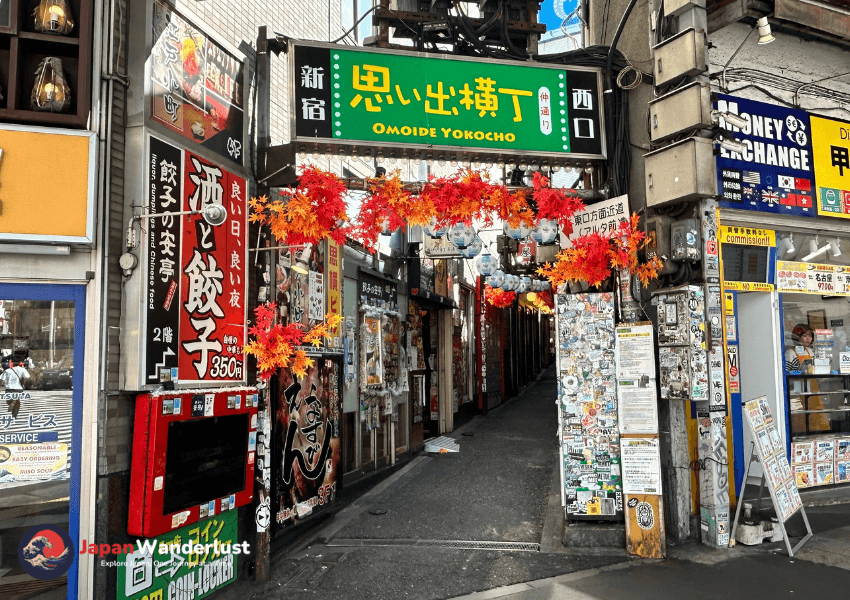
Omoide Yokocho, also known as “Memory Lane,” offers a quintessential izakaya dining experience in a nostalgic setting. This narrow alley, packed with tiny restaurants and food stalls, exudes an old-world charm that transports visitors back to post-war Tokyo. Popular food choices include sizzling yakitori skewers, grilled to perfection, and hearty ramen bowls, served in an intimate, bustling atmosphere.
The charm of Omoide Yokocho lies in its close-quarters dining, where the aroma of grilled meat mingles with the chatter of patrons. The dimly lit alley, adorned with vintage signs and hanging lanterns, invites locals and tourists alike to savor traditional Japanese cuisine while soaking in the ambiance of a bygone era.
- Address: 1-2 Nishishinjuku, Shinjuku City, Tokyo 160-0023, Japan
- Website URL: N/A
- Phone Number: N/A
14. Tokyu Kabukicho Tower: The Heart of Entertainment in Kabukicho
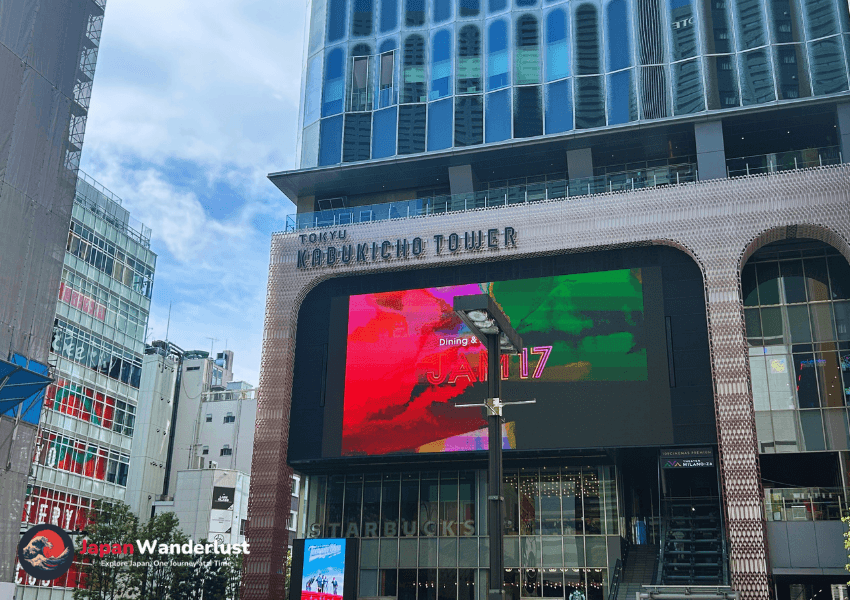
Tokyu Kabukicho Tower stands as a modern hub in the vibrant Kabukicho nightlife area. This multi-functional entertainment complex offers a range of attractions, including upscale dining options, cinemas showcasing the latest films, and event spaces that host various performances and activities. Its sleek architecture and central location make it a focal point for nightlife enthusiasts and casual visitors.
Within the tower, visitors can experience a fusion of dining and leisure, with restaurants offering both local and international cuisine. Tokyu Kabukicho Tower enhances the district’s lively reputation, providing a sophisticated venue that caters to a variety of entertainment preferences.
- Address: 1-29-1 Kabukicho, Shinjuku City, Tokyo 160-0021, Japan
- Website URL: N/A
- Phone Number: N/A
15. Bic Camera & Yodobashi Camera: Tech Enthusiasts’ Paradise
Bic Camera and Yodobashi Camera are iconic electronics stores that draw tech enthusiasts from around the world. These stores are renowned for their extensive range of gadgets, from the latest smartphones and cameras to home appliances and gaming equipment. Both locations provide a unique shopping experience, with knowledgeable staff and hands-on displays allowing customers to test products before purchasing.
The competitive pricing and tax-free shopping options make these stores a must-visit for tourists seeking high-quality electronics. Shoppers can explore multiple floors filled with an impressive variety of technology, ensuring that every tech need is met under one roof.
- Address (Bic Camera): 3-28-1 Shinjuku, Shinjuku City, Tokyo 160-0022, Japan
- Address (Yodobashi Camera): 1-11-1 Nishi-Shinjuku, Shinjuku City, Tokyo 160-0023, Japan
- Website URLs: Bic Camera | Yodobashi Camera
- Phone Numbers: N/A
16. Isetan Shinjuku: The Pinnacle of Luxury Shopping
Isetan Shinjuku is synonymous with luxury shopping, offering an unparalleled experience for fashion and lifestyle connoisseurs. The department store is home to a range of high-end brands, including globally renowned fashion labels and exclusive Japanese designers. Its elegant layout features meticulously curated sections for fashion, gourmet foods, home goods, and cosmetics.
One of Isetan’s standout features is its gourmet food floor, known as the depachika, where visitors can find artisanal delicacies, fresh produce, and prepared meals. This upscale shopping destination embodies sophistication and sets the benchmark for luxury retail in Tokyo.
- Address: 3-14-1 Shinjuku, Shinjuku City, Tokyo 160-0022, Japan
- Website URL: https://www.mistore.jp/store/shinjuku.html
- Phone Number: +81 3-3352-1111
17. Hands Shinjuku: A Treasure Trove of Crafts and Unique Gifts
Hands Shinjuku (formerly known as Tokyu Hands) is a must-visit for those who love DIY projects, crafts, and unique Japanese gifts. The store offers a wide variety of items, from home improvement tools and art supplies to quirky souvenirs and innovative gadgets. Each floor is filled with an array of products that spark creativity and cater to different hobbies and interests.
Visitors can browse through an eclectic mix of merchandise, including traditional Japanese crafts and modern design pieces, making it an ideal spot for finding one-of-a-kind gifts. The diverse selection ensures that Hands Shinjuku stands out as a shopping destination that merges practicality with creativity.
- Address: 5-24-2 Sendagaya, Shinjuku City, Tokyo 151-0051, Japan
- Website URL: https://shinjuku.hands.net/
- Phone Number: +81 3-5361-3111
18. Shinjuku Chuo Park: A Green Oasis in the Urban Landscape
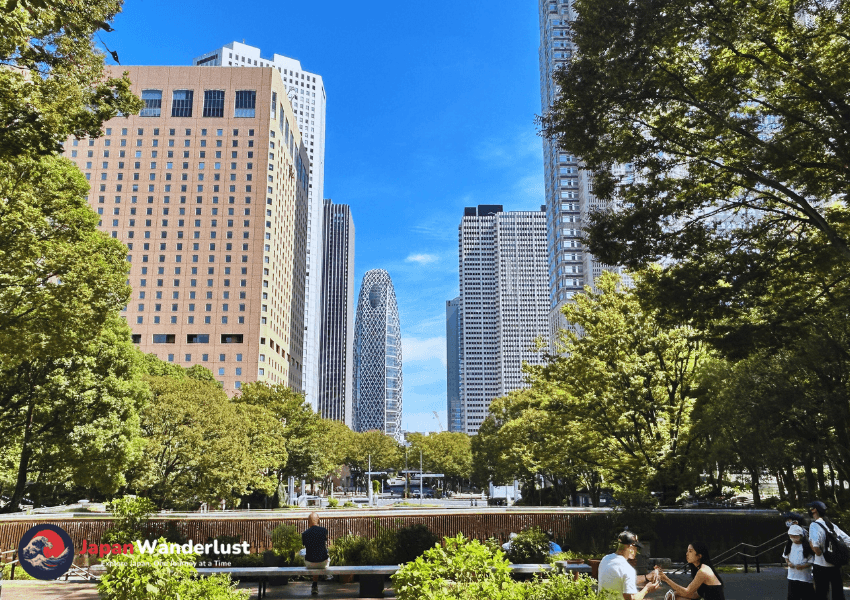
Shinjuku Chuo Park provides a refreshing escape from the bustling city streets, offering wide green spaces, shaded areas, and a scenic fountain. This urban park is a popular spot for picnics, leisurely strolls, and seasonal events that bring the local community together. The park’s central location, near the Tokyo Metropolitan Government Building, makes it easily accessible for both residents and visitors.
In addition to its natural beauty, Shinjuku Chuo Park features playgrounds for children and pathways lined with cherry trees that bloom in spring. The park’s relaxed atmosphere and ample seating areas make it a perfect retreat for those seeking tranquility amidst the vibrant Shinjuku district.
- Address: 2-11 Nishishinjuku, Shinjuku City, Tokyo 160-0023, Japan
- Website URL: N/A
- Phone Number: N/A
19. Godzilla Head: Iconic Movie Landmark in Kabukicho
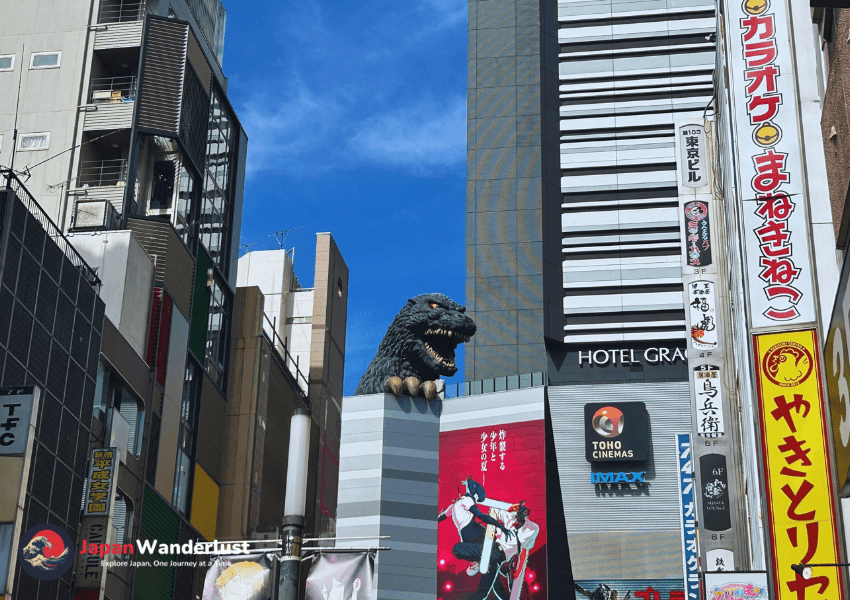
The Godzilla Head in Kabukicho is a striking sight that adds a playful touch to Tokyo’s vibrant skyline. Perched atop the Shinjuku Toho Building, this colossal replica draws inspiration from the legendary movie monster that has captured imaginations worldwide. It serves as an iconic photo spot, offering a unique opportunity to snap pictures that blend Tokyo’s modern architecture with a nod to cinematic history.
The head roars and lights up at scheduled intervals, adding an immersive experience for visitors. Its location in the heart of Kabukicho makes it a fun detour for movie enthusiasts and casual visitors exploring Shinjuku’s nightlife district.
- Address: 1-19-1 Kabukicho, Shinjuku City, Tokyo 160-0021, Japan
- Website URL: N/A
- Phone Number: N/A
20. 3D Cat Billboard: Digital Art Sensation in Shinjuku
The 3D Cat Billboard in Shinjuku has become a must-visit spot for fans of innovative digital art. Displayed on a high-definition curved LED screen, this interactive installation showcases a lifelike cat that appears to playfully jump out of the billboard, captivating passersby. The installation’s novelty and impressive visual effects have made it a viral sensation and a favorite for photo and video opportunities.
今日の15時半ごろに現地で撮られた映像です。雑踏が思いのほかうるさいので、声の大きさは調整しなきゃ。再生時、音量注意です!⚠️ pic.twitter.com/8OsmcyyVOo
— 新宿東口の猫 (@cross_s_vision) July 5, 2021
Located near Shinjuku Station, the 3D Cat Billboard is a testament to Tokyo’s embrace of modern technology and art. It has quickly become an icon, drawing both locals and tourists eager to witness this whimsical display firsthand.
- Address: 3-23-7 Shinjuku, Shinjuku City, Tokyo 160-0022, Japan
- Website URL: N/A
- Phone Number: N/A
21. Shinjuku Batting Center: A Fun Urban Sports Activity
The Shinjuku Batting Center provides a recreational experience that appeals to both locals and tourists looking for a bit of urban sport. Tucked into the cityscape, these batting cages offer visitors the chance to test their skills and enjoy a unique slice of Tokyo life. The batting center caters to all skill levels, making it suitable for beginners and seasoned players alike.
Equipped with automatic pitching machines, the center provides an entertaining way to break from sightseeing and engage in a bit of exercise. The atmosphere is laid-back, allowing visitors of all ages to enjoy a fun, competitive experience right in the heart of Shinjuku.
- Address: 2 Chome-21-13 Kabukicho, Shinjuku City, Tokyo 160-0021, Japan
- Website URL: N/A
- Phone Number: N/A
22. Meiji Jingu Baseball Stadium: An Exciting Sports Experience
Meiji Jingu Baseball Stadium offers the thrilling experience of attending a live baseball game in Tokyo. As part of the Meiji Jingu complex, the stadium is steeped in history and showcases Japan’s passion for the sport. Visitors can soak in the lively atmosphere, complete with enthusiastic cheering, stadium snacks, and the iconic singing of team songs.
The stadium is not only a hub for professional games but also a venue for concerts and special events. Its location near Meiji Jingu Gaien adds to its appeal, creating a perfect day out for sports enthusiasts and families alike.
- Address: 3-1 Kasumigaokamachi, Shinjuku City, Tokyo 160-0013, Japan
- Website URL: http://www.jingu-stadium.com/
- Phone Number: +81 3-3404-8999
23. Shin-Okubo Korea Town: A Lively Cultural Hub
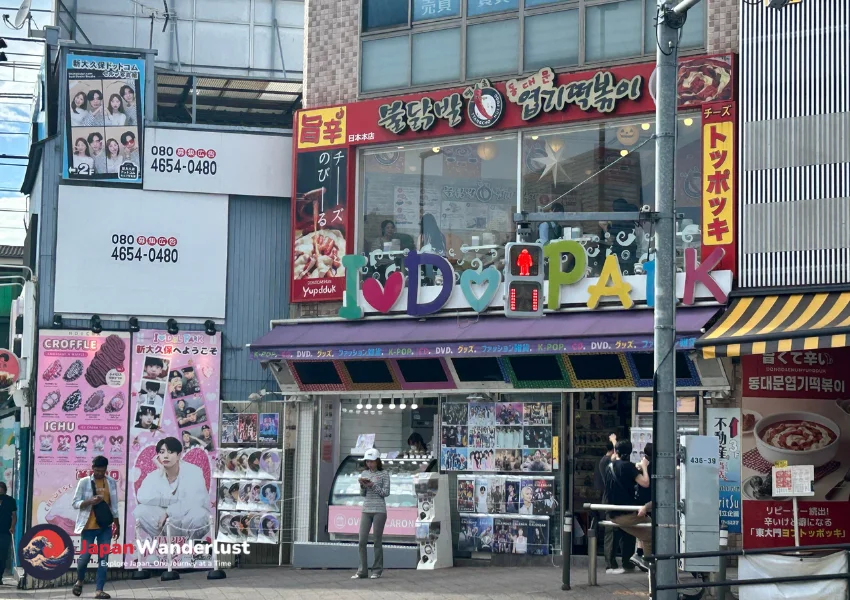
Shin-Okubo Korea Town in Shinjuku is a bustling district known for its rich Korean culture and vibrant atmosphere. Visitors can explore an array of authentic Korean restaurants, serving dishes like kimchi, bulgogi, and spicy tteokbokki. The area is also popular for its numerous K-Pop shops, offering the latest merchandise and music from top Korean artists.
Beyond food and music, Shin-Okubo provides a multicultural experience, with shops selling Korean cosmetics and fashion, creating a lively and diverse environment. It’s a perfect spot for those wanting to experience a slice of Korean culture without leaving Tokyo.
- Address: Shin-Okubo, Shinjuku City, Tokyo
- Website URL: N/A
- Phone Number: N/A
FAQs on What to Do in Shinjuku
What is Shinjuku best known for?
Shinjuku is renowned for its dynamic blend of modern skyscrapers and traditional touches. It boasts one of the busiest transportation hubs in the world, Shinjuku Station, which serves millions of commuters daily. This vibrant district is characterized by its iconic skyline, featuring towering buildings like the Tokyo Metropolitan Government Building. Shinjuku is also famous for its bustling nightlife and entertainment, with areas such as Kabukicho offering a wide range of bars, restaurants, and theaters.
In addition to its urban appeal, Shinjuku offers serene escapes, such as the Shinjuku Gyoen National Garden. The district seamlessly combines shopping, cultural experiences, and world-class dining, making it a must-visit destination for tourists and locals alike.
What are the top landmarks in Shinjuku?
Shinjuku’s landmarks offer a diverse range of attractions. The Tokyo Metropolitan Government Building provides breathtaking panoramic views of the city from its observation decks, perfect for photographers and sightseers. The Godzilla Head in Kabukicho is an iconic nod to Japanese pop culture, drawing visitors for unique photo opportunities. Shinjuku Gyoen National Garden offers a peaceful retreat with its lush landscapes, famous for cherry blossoms in spring and vibrant foliage in autumn.
Which shopping areas in Shinjuku are most popular?
Shinjuku’s shopping scene caters to every taste. Isetan Shinjuku stands out for its luxury brands and high-end fashion, providing a premium shopping experience. Bic Camera and Yodobashi Camera are go-to spots for electronics enthusiasts, offering an impressive range of gadgets and tech products. For those looking for a more eclectic vibe, Golden-Gai features narrow alleys with unique shops and bars, creating an unforgettable shopping and nightlife experience.
Are there unique cultural sites in Shinjuku?
Cultural enthusiasts will find plenty to explore in Shinjuku. The Hanazono Shrine, a historical Shinto site, offers a glimpse into Japan’s religious traditions and hosts vibrant festivals throughout the year. The Samurai Museum showcases samurai armor and weaponry, providing insight into the warrior class that shaped Japan’s history. Visitors can also engage in interactive experiences, such as dressing up in samurai attire. For a playful take on history, the Ninja Trick House offers hands-on activities that let visitors learn about ninja techniques and lore.
Why is Shinjuku so popular?
Shinjuku’s popularity stems from its unparalleled accessibility and diverse offerings. Shinjuku Station, the transportation heart of the district, connects numerous train and subway lines, making it a convenient starting point for exploration. The district’s shopping options, from luxury boutiques to electronics stores, attract a broad range of visitors. Shinjuku’s nightlife is legendary, with Kabukicho and Golden-Gai providing a mix of entertainment options that keep the area lively well into the night.
Tourist attractions such as the Tokyo Metropolitan Government Building, Shinjuku Gyoen, and cultural sites like the Samurai Museum add to its appeal, offering something for everyone. The blend of modern skyscrapers, bustling shopping districts, and tranquil gardens makes Shinjuku an essential part of any Tokyo itinerary.
Which is better, Shibuya or Shinjuku?
Shibuya and Shinjuku each offer unique experiences that cater to different interests. Shibuya is often associated with its youthful vibe, iconic attractions like Shibuya Crossing, and trendsetting shops. In contrast, Shinjuku is known for its mix of modern and traditional elements, highlighted by its towering skyscrapers and Shinjuku Station, one of the busiest transit hubs in the world. When it comes to nightlife, Shinjuku’s Kabukicho district is unmatched, while Shibuya features a vibrant, youthful scene with stylish bars and clubs.
Shopping in Shibuya leans towards fashion-forward boutiques and streetwear, attracting a younger crowd. Shinjuku, on the other hand, offers a wider variety from electronics at Bic Camera and Yodobashi Camera to luxury items at Isetan. Sightseeing opportunities also vary: Shibuya is famous for Shibuya Scramble and Hachiko Statue, while Shinjuku boasts landmarks like the Tokyo Metropolitan Government Building and Shinjuku Gyoen National Garden.
What are the key differences between Shibuya and Shinjuku?
The main differences between Shibuya and Shinjuku lie in their landmark attractions, general atmosphere, and the types of visitors they attract. Shibuya embodies youthful energy, with highlights such as the famous Shibuya Crossing one of the busiest pedestrian intersections globally that draw shoppers, trendsetters, and tourists eager to immerse themselves in modern Tokyo. On the other hand, Shinjuku offers a more diverse mix of experiences. From the historic Hanazono Shrine to the impressive Tokyo Metropolitan Government Building, it attracts visitors seeking a blend of tradition and modern urban life.
Demographically, Shibuya tends to attract younger visitors and fashion enthusiasts, while Shinjuku draws a wider array of people, including business travelers, tourists, and locals. Shinjuku’s vibrant nightlife in Kabukicho and cultural experiences at the Samurai Museum provide attractions for a broader audience.
Which area has better dining options: Shibuya or Shinjuku?
Shibuya and Shinjuku each have distinct dining scenes that cater to varied tastes and preferences. Shibuya is known for its trendy cafes and modern eateries that attract a youthful crowd, offering international cuisine and stylish interiors. In contrast, Shinjuku boasts a more diverse and traditional dining experience, featuring everything from bustling izakayas to upscale sushi restaurants. This variety makes Shinjuku ideal for those looking to explore both high-end and casual Japanese dining.
While Shibuya excels in offering hip spots perfect for brunch or themed cafes, Shinjuku’s food districts, such as Omoide Yokocho and Golden-Gai, deliver authentic local experiences with their small, lively eateries and bars.
Is Shibuya or Shinjuku more family-friendly?
Yes, both Shibuya and Shinjuku offer family-friendly activities, but each caters to different needs. Shibuya features the Hachiko Statue and shopping complexes with kid-friendly spaces, creating an engaging atmosphere for families. Families can enjoy the bustling yet safe environment around Shibuya Scramble, providing an urban experience with modern attractions.
Shinjuku, however, offers more green spaces like Shinjuku Gyoen National Garden, where families can relax and have picnics. Shinjuku Station enhances the area’s accessibility, making travel easier for families with children. Shinjuku’s mix of cultural and educational spots, such as the Samurai Museum, provides enriching experiences suitable for older children.
Shinjuku offers educational and cultural spots like the Samurai Museum, which can be an engaging experience for older children. Both districts have plenty of dining options that cater to families, but Shinjuku’s range of casual eateries and large restaurants may offer more variety.
How does Shinjuku compare to Shibuya for sightseeing?
To experience sightseeing in Shibuya, visitors should focus on modern attractions. Start by visiting Shibuya Crossing, one of the world’s busiest pedestrian intersections, perfect for photos and capturing the dynamic energy of Tokyo. Continue to the Hachiko Statue, a popular meeting point with historical significance, and the 3D Cat Billboard, a unique digital art display that enhances the area’s futuristic feel. Shibuya’s streets feature neon lights and large video screens, contributing to its vibrant cityscape.
To enjoy sightseeing in Shinjuku, visitors can explore the Tokyo Metropolitan Government Building, which offers panoramic views of the city. Stroll through Shinjuku Gyoen for a peaceful touch of nature or visit Hanazono Shrine for a glimpse into traditional culture. For history enthusiasts, the Samurai Museum provides an immersive experience into Japan’s warrior heritage. Shinjuku’s diverse attractions make it ideal for those seeking a mix of modern and historical experiences.
Why is Shinjuku Station famous?
To understand why Shinjuku Station is famous, you should look at its role as a major commuting hub in Tokyo. Shinjuku Station handles over 3.5 million passengers daily, making it one of the busiest train stations in the world. The station connects multiple major train lines, including the JR East, Odakyu, and Keio lines, which enhances its accessibility and importance for commuters.
Beyond its transportation significance, Shinjuku Station offers a vast network of shopping and dining options within its complex. Visitors can find everything from high-end boutiques to casual eateries, making it a convenient stop for both locals and tourists. Its central location in Shinjuku further solidifies its reputation as a key part of Tokyo’s infrastructure.
What makes Shinjuku Station unique compared to other Tokyo stations?
To identify what makes Shinjuku Station unique, consider its high passenger traffic, diverse amenities, and intricate layout. Shinjuku Station holds the record for being the busiest station globally, serving millions of people daily. Unlike many other Tokyo stations, it features a wide range of amenities, including department stores, specialty shops, and food halls, all integrated within the station.
The station’s complex layout, with multiple exits and interconnected passageways, sets it apart and adds to its uniqueness. While navigating it may seem overwhelming, its extensive connectivity and services make it an essential part of Tokyo’s transportation network.
How can visitors navigate Shinjuku Station easily?
To navigate Shinjuku Station easily, visitors should familiarize themselves with key navigation tips. Start by following the station’s well-marked signage, which is available in multiple languages. Using station maps and smartphone navigation apps can also help travelers find their way around efficiently.
Another useful strategy is to identify major landmarks within the station, such as department store entrances or information desks. These can serve as reference points when moving through the station’s extensive network of platforms and hallways. For added assistance, visitors can seek out station guides or staff for directions.
What are some interesting facts about Shinjuku Station?
To highlight interesting facts about Shinjuku Station, note its impressive daily foot traffic and rich history. The station serves over 3.5 million passengers each day, holding the Guinness World Record for the busiest transport hub. It first opened in 1885, evolving from a modest stop into a comprehensive transit and shopping complex.
Unique features of Shinjuku Station include its vast number of exits over 200 and an intricate network of underground passages. The station’s ability to handle such high traffic efficiently showcases its exceptional design and operational management, making it a marvel in public transportation.
Is Shinjuku suitable for solo travelers?
Yes, Shinjuku is suitable for solo travelers due to its safety, diverse dining options, and easy access to attractions. The district’s bustling streets are well-lit and frequently patrolled, creating a secure environment for solo visitors. With Shinjuku Station at its core, travelers have seamless connectivity to various parts of Tokyo, making sightseeing convenient.
Dining in Shinjuku offers solo-friendly options, ranging from lively izakayas to cozy ramen shops, where eating alone is common and welcomed. For those exploring on their own, local attractions such as Shinjuku Gyoen and the Samurai Museum provide enriching experiences that can be enjoyed at a personal pace.
What are the best hotels near Shinjuku Station?
To find the best hotels near Shinjuku Station, you should consider options that cater to different styles and budgets. Proximity to the station ensures easy transit and access to local attractions, making these hotels highly convenient for travelers.
Are there budget-friendly hotels near Shinjuku Station?
Budget-friendly hotels near Shinjuku Station offer comfort and accessibility without breaking the bank. Here are a few recommended options:
- Hotel Sunroute Plaza Shinjuku – Affordable rooms with modern amenities and a short walk from Shinjuku Station.
- APA Hotel Shinjuku Kabukicho Tower – Compact yet well-equipped rooms situated in the lively Kabukicho area.
- Capsule Hotel Anshin Oyado Premier Shinjuku Station – A unique capsule hotel experience with excellent amenities for budget travelers.
- Hotel Listel Shinjuku – Reasonably priced with comfortable rooms, located slightly off the main area but within walking distance.
- Tokyo Business Hotel – Basic accommodations that offer convenience and a no-frills stay close to Shinjuku’s attractions.
What luxury hotels are popular around Shinjuku Station?
Luxury hotels near Shinjuku Station provide exceptional services and premium experiences. Here are some notable choices:
- Park Hyatt Tokyo – Renowned for its panoramic city views and luxurious amenities, featured in the film Lost in Translation.
- Hilton Tokyo – Offers upscale accommodations, multiple dining options, and direct access to Shinjuku’s shopping districts.
- Hyatt Regency Tokyo – Known for its refined services and proximity to Shinjuku Central Park.
- Keio Plaza Hotel Tokyo – A high-end hotel with varied dining experiences and elegant rooms.
- The Tokyo EDITION, Toranomon – A stylish, luxury option that blends modern design with traditional Japanese aesthetics.
Which hotels near Shinjuku Station have easy access to local attractions?
Hotels with convenient access to local attractions can enhance the stay for visitors prioritizing location. Recommended options include:
- Hotel Gracery Shinjuku – Famous for the Godzilla Head, this hotel situates guests close to Kabukicho and Shinjuku’s entertainment spots.
- JR Kyushu Hotel Blossom Shinjuku – Positioned near the station and within walking distance to Shinjuku Gyoen.
- Century Southern Tower Hotel – Offers spectacular views and proximity to shopping areas and major landmarks.
- Shinjuku Prince Hotel – Located near the vibrant shopping and dining of Shinjuku.
- Citadines Central Shinjuku Tokyo – Perfect for those wanting easy access to both the station and surrounding attractions
Planning Your Time in Shinjuku
Shinjuku rewards both quick visits and slower exploration. From neon-lit streets and tucked-away eateries to observation decks and peaceful green spaces, the district reflects the many faces of Tokyo in one compact area. Whether you come for dining, city views, or everyday local scenes, it’s a place that reveals something new each time you return.
If you’re planning to explore beyond Shinjuku, our related guides highlight nearby neighborhoods and other areas of Tokyo worth adding to your itinerary. Families who prefer a smooth, stress-free day can also consider a family-friendly private tour, while travelers seeking a deeper look at the city may enjoy a Tokyo private tour designed around their interests and pace.

